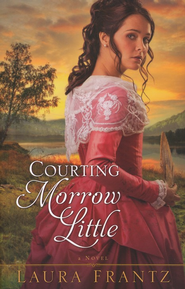Upon rereading this novel, I was struck again by how much depth it has, and I remembered why I liked it enough to purchase it.
When I first decided to read Laura Frantz's novels, I was hesitant to read this one; when a plot is entirely about various men pursuing a girl who can't make up her mind, I get annoyed. However, that is not how the novel played out at all! There is comparatively little courting going on, though a number of men would do so if she would let them. Rather, it is the story of a young woman returning to the wilderness after several years in the colonies, and how she overcomes the ghosts of the past and learns to live in a harsh land. Morrow grows considerably through the book - from a shy, wilting Philadelphia belle afraid of her own shadow to a strong frontier woman.
When I first decided to read Laura Frantz's novels, I was hesitant to read this one; when a plot is entirely about various men pursuing a girl who can't make up her mind, I get annoyed. However, that is not how the novel played out at all! There is comparatively little courting going on, though a number of men would do so if she would let them. Rather, it is the story of a young woman returning to the wilderness after several years in the colonies, and how she overcomes the ghosts of the past and learns to live in a harsh land. Morrow grows considerably through the book - from a shy, wilting Philadelphia belle afraid of her own shadow to a strong frontier woman.
 Unlike
many novels about the American Revolution, which typically center on
the fight between colonists and Redcoats, Frantz looks closer at the war
between the Blue Coats (Americans) and native tribes, who were largely
allied with the British, and how the Americans broke many treaties
without punishment in order to destroy as many of the Native Americans
as possible. As experienced through Morrow Little's eyes, this novel
shows the unfairness to the Indians by many of the Americans in their
war to take control of the country, and the unfairness to any white
person who would live with them (for they surely must be either a
traitor or a captive held against their will).
Unlike
many novels about the American Revolution, which typically center on
the fight between colonists and Redcoats, Frantz looks closer at the war
between the Blue Coats (Americans) and native tribes, who were largely
allied with the British, and how the Americans broke many treaties
without punishment in order to destroy as many of the Native Americans
as possible. As experienced through Morrow Little's eyes, this novel
shows the unfairness to the Indians by many of the Americans in their
war to take control of the country, and the unfairness to any white
person who would live with them (for they surely must be either a
traitor or a captive held against their will).
Overall,
it was so much better than I expected - the story of life and war, not
just a romance that is wrapped up at love's first kiss. Yes, there are
the magical moments as she goes from distrust to falling in love, but it
continues past the wedding ceremony to learning about each other as a
married couple amidst a land fraught with danger. It is a novel of great
depth reminiscent of "The Last of the Mohicans" and "Ghost Fox". 5
stars.

